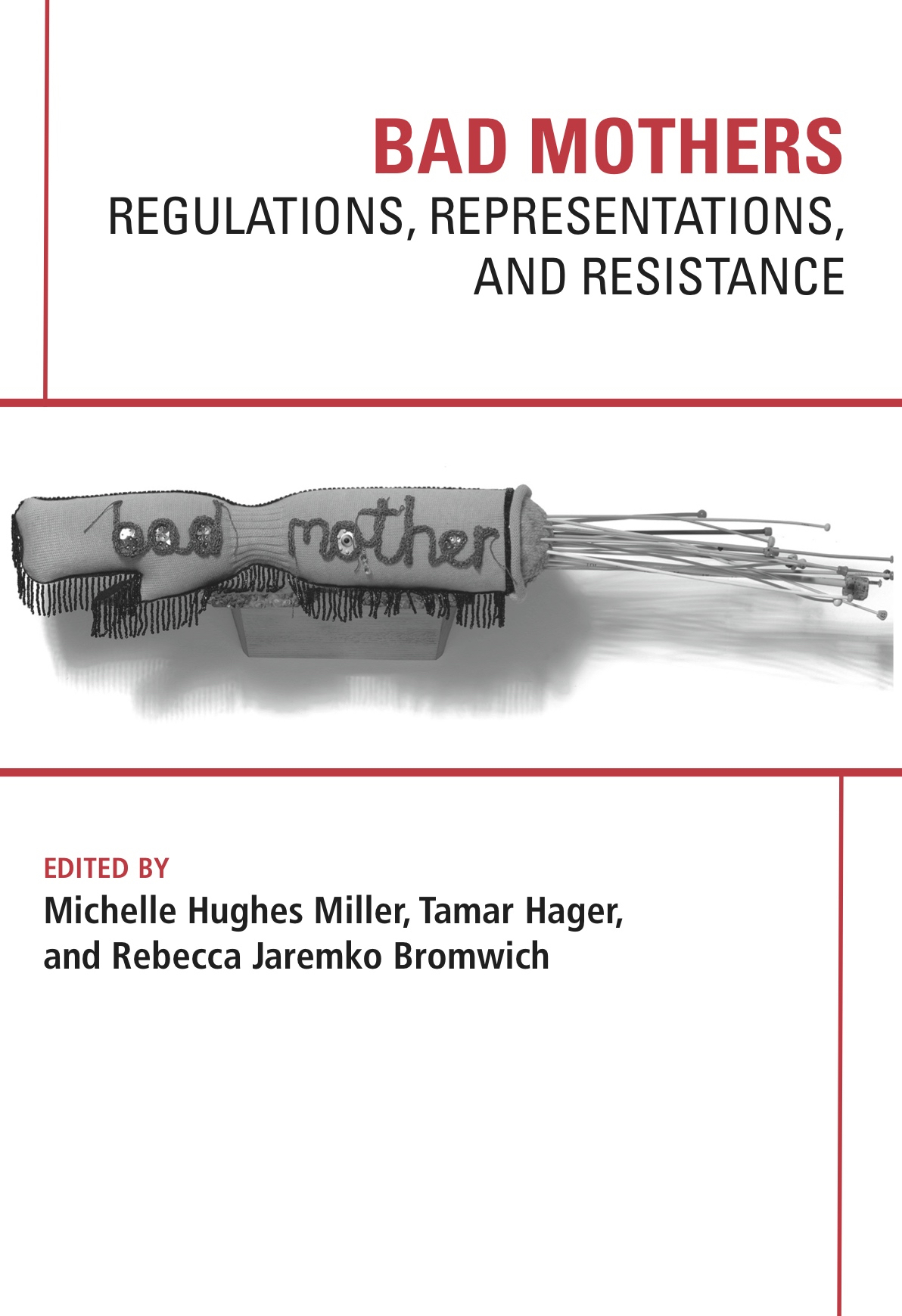
Price: $34.95
Page Count: 343
Publication Date: March 2017
ISBN: 978-1-77258-103-4
“Bad Mothers makes a significant contribution to understanding how the constructed ‘dangerous mother’ continues to trouble major institutional areas such as law, governance, economy, and child protection services in ways that reveal why our society remains invested in marginalizing mothers instead of seriously addressing the numerous, interconnecting obstacles they face in raising children.”
—ERICA S. LAWSON, Associate Professor, Department of Women’s Studies and Feminist Research, University of Western Ontario
“Through visual and literary works, this collection demonstrates the resistance of those who refuse to conform to the institutions that earn them the label of bad mothers.”
—ARLENE SGOUTAS, Associate Professor and Director, Institute for Women’s Studies and Services, Metropolitan State University of Denver
Acknowledgements
Introduction
The Bad Mother, in Relief
Michelle Hughes Miller, Tamar Hager,and Rebecca Jaremko Bromwich
i: the legal and regulatory landscape
Arctic Motherwork
Rebecca Jaremko Bromwich
Still Wearing Scarlet? Discursive Figures of the
Unfit Mother as Pervasive Phantoms Active in Governing
Mothers through Ontario’s Child Protection Regime
Rebecca Jaremko Bromwich
Manufacturing Ideologies of the “Bad” Mother:
Aboriginal Mothering, “Neglectful” Caregiving, and Symbolic
Violence in the Ontario Child Welfare System
Mandi Veenstra and Marlee Keenan
Mothering in Prison: The Case of Spain’s
New External Mother Units
Sophie Feintuch
ii: medicalization as social control
Mea Culpa
Noa Arad Yairi
“Bad Mothers” and the hiv/aids Epidemic in
Saskatchewan, Canada
Pamela J. Downe
The Risky Mother: The Medicalization of Mothering
Alexandra Campbell
Hospital Archive
Rela Mazali
Fat Blame and Fat Shame: A Failure of Maternal Responsibility
Kelsey Ioannoni
iii: cultural representations of bad mothers
Protection
Nonavee Dale
Malas Madres in Contemporary Latin American Literature:
Representing Ill-Fated Motherhood in Myriam Laurini’s
Qué Raro Que Me Llame Guadalupe
María Alonso Alonso
Celluloid Marys: Discovering and Listening to the Bad Mothers
Behind the Criminals in Popular Crime Films
Michelle Hughes Miller, Geraldine M. Hendrix-Sloan, and M. Joan McDermott
Bad Motherhood in Contemporary Argentine Cinema:
Illustrating the New Political Agenda
Fernando Gabriel Pagnoni Berns, Patricia Vazquez, and Juan Juvé
iv: resisting bad mother narratives
Bad Mother
Freddie Robins
Underneath Broadmoor
Tamar Hager
Feminism, Infanticide, and Intersectionality in Victorian America
Keira V. Williams
Fixed or Shifting Notions of “Bad Mother”?
Considering Past and Future Australian Adoption Practice
Susan Gair
Refusing to Obey: Bad Mothers in the Israeli Culture
Omri Herzog and Tamar Hager
v: where do we go from here?
Wings and Roots
Heather Munro
Furry Love
Liat Elkayam
Medea Chic: On the Necessity of Ethics as Part of the
Critique of Motherhood
Miri Rozmarin
About the Contributors
Dr. Michelle Hughes Miller is an Associate Professor of Women’s and Gender Studies at the University of South Florida. She earned her M.A. and PhD in Sociology at the University of Nebraska-Lincoln while raising two wonderful children with her husband, Rob Benford. As a feminist criminologist she researches motherhood within legal and policy constraints. In addition to publishing on criminalized and allegedly “bad” mothers, she is co-editor of Addressing and Preventing Violence Against Women on College Campuses (Temple University Press, forthcoming) and Alliances for Advancing Academic Women: Guidelines for Collaborating in STEM (Sense Publishers, 2014). She is currently analyzing discourses of mothering in global economic and social campaigns, along with very much enjoying being a new grandma.
Dr. Tamar Hager is a Senior Lecturer in the Departments of Education and Gender Studies at Tel Hai College, Israel. Motherhood, critical feminist methodology, art sociology and fictional and academic writing, multiculturalism and critical pedagogy are core issues of her academic research, writing, teaching and social activism. She is the founder and the former co-director of the college’s center for Peace and Democracy, whose mandate is to academically and administratively develop and implement the multicultural vision of the college. She published in 2000 a book of short stories A perfectly Ordinary Life (in Hebrew) and in 2012 Malice Aforethought (in Hebrew), in which she attempts to reconstruct the elusive biographies of two English working class mothers who killed their babies at the end of the 19th century.
Dr. Rebecca Jaremko Bromwich is a mother of four who works as lawyer, legal academic, writer, artist, and activist. She has a PhD in law and legal studies from Carleton University, an LL.M. and LL.B. from Queen’s University, a Graduate Certificate in Women’s, Gender, and Sexuality Studies from the University of Cincinnati, and a BA (Hon.) in anthropology from the University of Calgary. She has published articles and texts on many áreas of law as they related to mothers, gender, and equality and is author of Looking for Ashley: Re-Reading What the Smith Case Reveals About Governance of Girls, Mothers, and Families in Canada. (Demeter Press, 2015). Rebecca has been practicing law in Ontario, Canada, since 2003.


